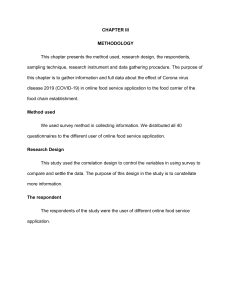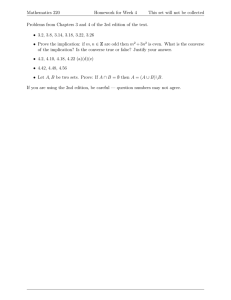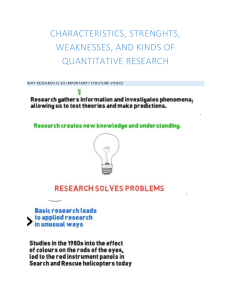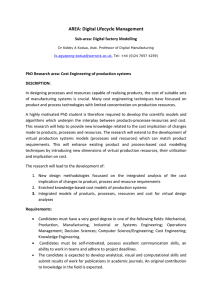Students' Perspective on Research & Education Implications
advertisement
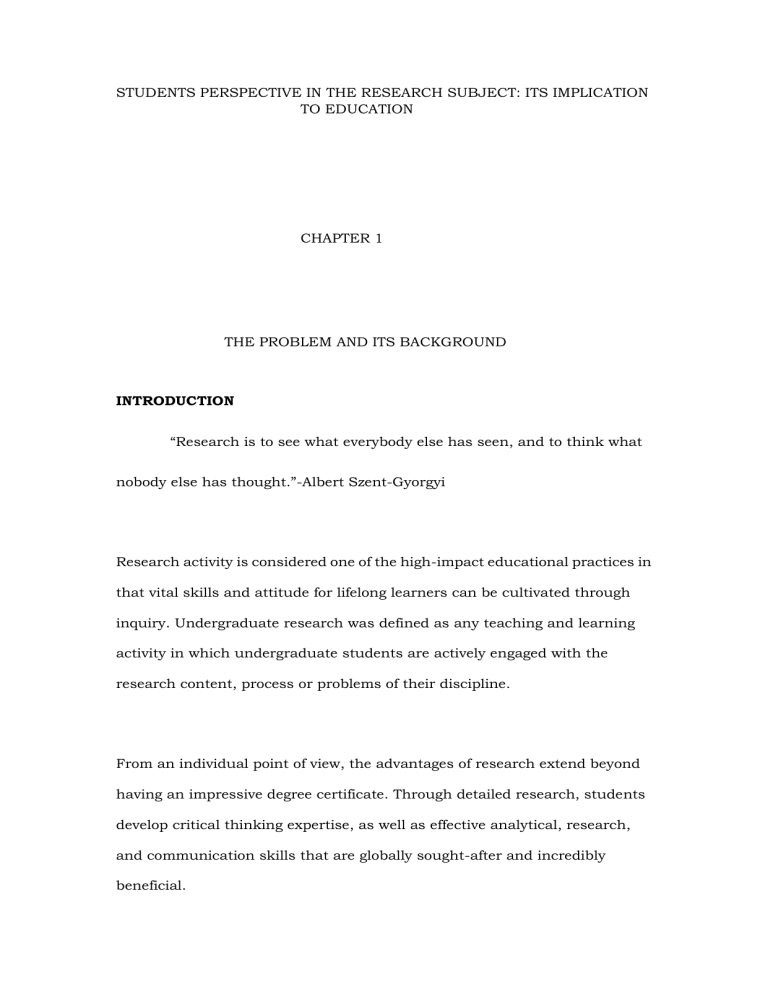
STUDENTS PERSPECTIVE IN THE RESEARCH SUBJECT: ITS IMPLICATION TO EDUCATION CHAPTER 1 THE PROBLEM AND ITS BACKGROUND INTRODUCTION “Research is to see what everybody else has seen, and to think what nobody else has thought.”-Albert Szent-Gyorgyi Research activity is considered one of the high-impact educational practices in that vital skills and attitude for lifelong learners can be cultivated through inquiry. Undergraduate research was defined as any teaching and learning activity in which undergraduate students are actively engaged with the research content, process or problems of their discipline. From an individual point of view, the advantages of research extend beyond having an impressive degree certificate. Through detailed research, students develop critical thinking expertise, as well as effective analytical, research, and communication skills that are globally sought-after and incredibly beneficial. That is, research is not merely pursuit of academic career and advancement of knowledge. Rather, it is also includes an aspect of learning process. Development of research skills is also important in health professions education. I would like to discover the students perspective in the research subject and its implication to education. Ultimately, research is essential economic and social development of our globalized society, forming the foundations governmental policies around the world. “Knowledge generated by research is the basis of sustainable development, which requires that knowledge be placed at the service of development, and be converted into applications, and be shared to ensure widespread benefits.” (Mary-Louise Kearney, Director of the UNESCO Forum on Higher Education, Research and Knowledge). Research is not only an invaluable tool for building on crucial knowledge , it’s also the most reliable way we can begin to understand the complexities of various issues; to maintain our integrity as we disprove lies and uphold important truths; to serve as the seed for analyzing convoluted sets of data; as well as to serve as ‘nourishment’, or exercise for the mind. Although research activity as an educational practice has been increasingly employed in a variety of disciplines as well as in diverse cultural contexts, students might take different preferred approaches to learning across culture. STATEMENT OF THE PROBLEM Generally, this study aims to answer the following questions: 1. What is the profile of respondents according to: A. Gender B. Age 2. What are the students perspective in the research subject? 3. What are the implication of students perspective in the research subject to education? SIGNIFICANCE OF THE STUDY The results of the study will be deemed important to the following: TEACHERS With the result of the study it can help them to identify and assess the students perspective in the research subject and its implication to education. STUDENTS The study will help them to find out what are their perspective in the research subject and its implication to education. To diagnose what are things they need to do that can help them to have a faster learning about research subject. PARENTS The finding of the study gives parents the chance to step back and take a look at how their children are doing in their child care and arrangements. FUTURE RESEARCHERS The study will support further researchers concerning the students perspective in the research subject and its implication to education. It can be their basis and pattern that can help them with their research for it to have strong foundation. SCOPE AND DELIMITATIONS This study is limited for Grade-12 students from Tuao Vocational and Technical School Malummin Annex, through direct survey, I can elicit information about the said topic. This way, I will be determined the students perspective in the research subject and its implication to education. The researcher will use questionnaires forms to gather the needed data. THEORETICAL FRAMEWORK School-based research is claimed by Joyce (1991) to be one of the five ‘doors’ to improving practice within schools and systematic enquiry into how educational institutions are led is, or should be, a crucial component institutional improvement and improved outcomes. Traditionally, such research has been carried out by ‘expert’ researchers based in higher education institutions, but recent years have revealed an increasing emphasis on the importance of school-based research as part of continuing professional INPUT and we have argued elsewhere the practitioners need to be seen development as equal partners with academic researchers in the process of producing Determine the evidence to raise standards (Burton and Bundrett, 2005: 21). students perspective in the research subject Morrison suggests that educational research has a twin focus: and its implication attitudinal- ‘a distinctive way of thinking about educational phenomena’, and to education. action- a systematic means of investigating them(2002: 3). Brown and Dowling make an attempt to distinguish between ‘professional educational practice’ - the reflective practitioner - and ‘educational research practice’ (1998:165) which tries to address and understand the deeper issues underlying educational phenomena by asking the question ‘why?’ and not just raising the more immediate and more practical considerations of ‘what?’ and ‘how?’ This suggests that whilst educational research will certainly influence what happens in the classroom, the major force of its impact will be in the long-term policy decisions made within educational institutions. CONCEPTUAL FRAMEWORK PROCESS Questionnaires or surveys will be distributed to the Grade-12 students of Tuao Vocational and Technical OUTPUT The result will be served as their guide to know the students perspective in the research PURPOSE OF THE STUDY To determine the students perspective in the research subject and its implication to education. RESEARCH HYPOTHESIS HA: There is significant implication of students perspective in the research subject to education. HO: There is no significant implication of students perspective in the research subject to education. DEFINITION OF TERMS PERSPECTIVE -a mental view or prospect to gain a broader perspective on the international scene. IMPLICATION -the fact or state of being involved in or connected to something. INQUIRY -a systematic investigation often of a matter of public interest. NOURISHMENT -something that encourages development of ideas. ENQUIRY - is a question which you ask in order to get information. CHAPTER II REVIEW OF RELATED LITERATURE Research impact is variously defined but can be summarized as having an effect, benefit, or contribution to economic, social, cultural, and other aspects of the lives of citizens and society beyond contributions to academic research (Barnes, 2015). Research as a discipline focus on acquiring and developing knowledge which can be employed in categorizing, describing, explaining, evaluating, correlating, comparing, predicting, and controlling situations, phenomena, and other observations (William, 2011). It is closely linked with the (Emsen, Kilic, and Suran, 2011). Research involves the collation and analysis of information to improve the human understanding of phenomena under study (Bahadori et al., 2015). It entails data collection, analysis, interpretation, and assessment procedures conducted in a planned manner in order to find solutions to a problem (Burton and Walters, 2013; Rezaei and Miandashti, 2013). Research is frequently carried out tertiary and research institutions (Hosseinpour, 2011; Kobova, 2014). Jiang and Roberts (2011) found that students perceive research as a new way of learning which they described as active and challenging. Research enhances students’ understanding of their own learning process and to see nuances in other research designs (Jiang and Robert, 2011; Madan and Teitge, 2013). Research was made at a university function in addition to the task of teaching in the late nineteenth century after the first academic revolution (Etzkowitz, 2003). Since then, attention to research is one of the most important issues in scientific communities (Bahadori et al., 2015). In recent years, research output emanating from academics has been assessed and used to rank universities against each other (Gross, 2004; Williams, 2013). Publishing of research investigations and a guarantee of subsequent research finding for sustainability of the institute’s mandate and organizational goals (Hegde et al., 2017). The perceptions of students have significant impact on the success of an organization (Tsui et al., 1997; Garner and Hunter, 2013). More so, students satisfaction toward research and publishing practices will enhance the developmental goal and strategic management of the institution and vice versa (Bhatti and Qureshi, 2007; Tella et al., 2007). The attitude and perception of students toward research and publishing in the institution essentially depends on job satisfaction (Syed et al., 2012). Indeed, research widens the perspective of students and develop their understanding and awareness about science and engineering (National Research Council, 2012; Vossen et al., 2018). Beyond the academic world, acquiring research skills is seen to be scientifically literate (Murtonen, 2008). Research is considered to be crucial to the economic development of any state and in addressing social, political, religious, and environmental concerns (Garg, Madhulika & Passey, 2018). In the field of education, research is generally considered to foster critical thinking among students. Critical thinking involves the capacity to evaluate information and decide how to deal with it (Lamb, Maire & Doecke, 2017). Positive conceptions of research among students might be a good start for future research directions. This should hopefully translate into more positive learning achievements and study orientations. Murtonen et al. (2008) posited students’ beliefs and views toward research may impact views of its role in their future careers. Students who were given research tasks before are generally considered to be more prepared for future work (Garg, Madhulika & Passey, 2018).When research activity involves peer-reviewing and receiving of negative reviews, emotional stress sometimes bothers the students and lowers their confidence level to the point of giving up (Hromova, 2018). We are aware that our research findings were shaped by our perspectives, we “reflexively” explain wherever possible our own as well as informants’ knowledge-construction processes, our research assumptions, our decisions about data collection and analysis, and the collaborative procedures through which we arrived at our findings (Latour and Woolgar 1979, 273-286). Research may also be understood as meaning one’s own disciplinary-based research, others’ disciplinary-based research or pedagogical research (Jenkins & Zetter 2003). Documenting approaches to research -led education as case studies and examples has led to the development of descriptive frameworks to clarify educational purpose and outcomes (Jenkins, Healey, & Zetter 2007). However, there has been little research into students’ experiences and perceptions of academic research at the departmental level (Volkwein & Carbone 1994). Students were found to have mixed reactions to academic research because research made their lecturers less available to them; however, many valued academic research and wanted it to be more visible to them (Zamorski 2002; Lindsay, Breen & Jenkins 2002; Robertson & Blackler 2006). Student’s perceptions of the relevance of research to their learning were also influenced by disciplinary perspectives. Research was less valued by those with practical and applied orientations to careers and knowledge; in particular, postgraduate students ended less often to perceive research as salient to their own goals and motivations (Lindsay, Breen & Jenkins 2002). However, as Healey(2005) suggests, the greatest impacts on students’ learning and understandings of research arose from their experiences of doing research in the learning project. The research activities in the case-study simulation involved students in applying knowledge derived from the lecturer’s research to construct their own solutions to a problem. This activity required that students understand research to include extending, reinterpreting and/or transforming knowledge. This understanding of research is similar to understanding asconceptual change (Prosser & Trigwell 1999). CHAPTER III RESEARCH METHODOLOGY RESEARCH DESIGN This study utilize descriptive method of research design to determine the students perspective in the research subject and its implication to education. DATA GATHERING PROCEDURE Before conducting the research study or gathering data I will write a letter of permission to the parents of the respondents, regarding to the study. Upon the approval of parents, the questionnaires will be distributed to the respondents to answer or fill out the needed information. Since we are experiencing crisis, researcher will inform the respondents to follow the protocols in response to the corona virus disease while answering the questions. I will assure that responses of the respondents will keep confidential. LOCALE OF THE STUDY The study will be conducted in the house of every respondents. The purpose of the study is to collect data to the Grade-12 students of Tuao Vocational and Technical School Malummin Annex. SAMPLE RESPONDENTS The researcher considered the Grade-12 students of Tuao Vocational and Technical School Malummin Annex comprising of 72 members, male and female. They were the chosen respondents because they will undertake a research study. Moreover, their generation is evidently more dependent on technology than the way people used to before. RESEARCH INSTRUMENT The study will use questionnaires as its research instrument because it gathers data faster than any method and it is most convenient among all other instruments.. The questionnaires consisted of items that will be determined the students perspective in the research subject and its implication to education. DATA ANALYSIS In determining the students perspective in the research subject and its implication to education, the Likert Scale will be used. FORMULA: __ ∑WX X= —— N WHERE: W= points X= number of respondents per weight N=total number of respondents
